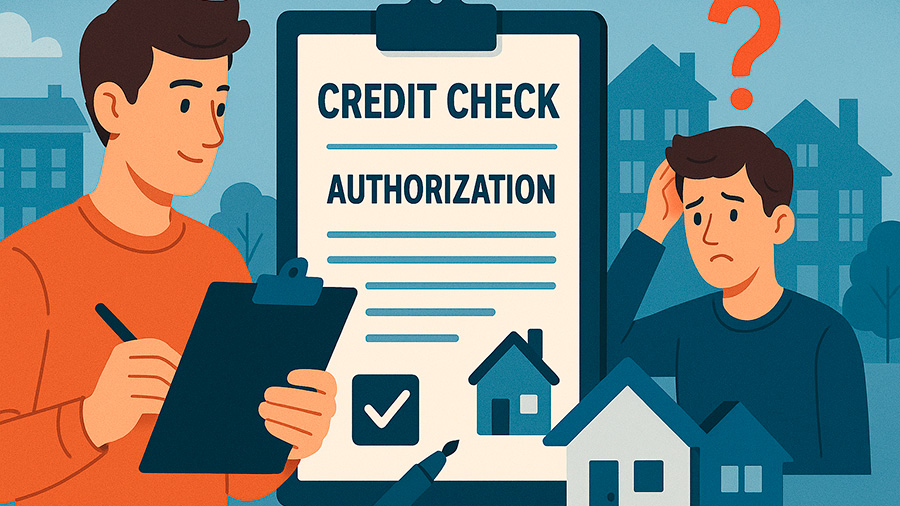Behind the Lease: Understanding How Landlords Evaluate Credit Before Renting an Apartment

Finding a new place to live is one of the most exciting—and sometimes nerve-wracking—experiences in adult life. While most renters focus on location, price, and amenities, there’s another crucial factor that determines whether you’ll actually get the keys: your credit report. The practice known as the process for apartment rental credit checks plays a decisive role in the housing market. It’s how landlords, property managers, and leasing companies evaluate whether a potential tenant can be trusted to pay rent on time. Understanding how this process works, what is checked, and how to prepare can make the difference between an approved application and a rejected one.
Why Landlords Check Credit
From a landlord’s perspective, renting out an apartment is a business transaction. Every tenant represents both potential income and potential risk. Landlords don’t just rely on intuition or casual conversation—they turn to credit reports because these offer a factual record of how someone handles financial responsibilities. The logic is simple: a person who pays bills on time is likely to pay rent on time. That’s why the process for apartment rental credit checks is considered an essential step in tenant screening. It protects landlords from loss and ensures that reliable renters gain access to quality housing.
Who Conducts the Credit Check
Credit checks are typically performed by property management companies or independent screening agencies authorized by the landlord. These agencies use information from one or more major credit bureaus—Equifax, Experian, or TransUnion. Some landlords use third-party tenant screening services that combine credit data with background and eviction reports. In larger apartment complexes, this process is fully automated, while smaller landlords may request a copy of your credit report directly with your consent. Either way, the process for apartment rental credit checks follows strict legal guidelines under the Fair Credit Reporting Act (FCRA), which ensures accuracy, privacy, and transparency in how your data is used.
What Exactly Is Checked During the Process
When you apply for an apartment, landlords don’t just look at a number—they analyze your financial behavior. The credit score provides a quick snapshot, but the full report reveals the story behind it. Here’s what they typically review during the process for apartment rental credit checks:
- Credit score: The numerical rating (usually between 300 and 850) that indicates your creditworthiness.
- Payment history: Records of on-time or late payments across loans, credit cards, and utilities.
- Debt-to-income ratio: The proportion of your income that goes toward paying existing debts.
- Public records: Bankruptcies, evictions, or judgments that may signal financial instability.
- Recent credit inquiries: A list of new applications for credit, which may indicate financial stress.
In most cases, landlords are more concerned with patterns than perfection. A single late payment years ago may not hurt you, but frequent delinquencies or unpaid debts could raise red flags. Understanding what’s inside your report is the first step toward taking control of the process for apartment rental credit checks.
Table: Key Credit Factors Landlords Evaluate
| Credit Component | What It Tells the Landlord | How to Improve It |
|---|---|---|
| Payment History | Reliability in paying bills on time | Set reminders or autopay to avoid late payments |
| Credit Utilization | How much of your available credit you use | Keep balances below 30% of limits |
| Length of Credit History | Experience in managing credit responsibly | Keep older accounts open to show longevity |
| Recent Inquiries | Frequency of credit applications | Limit new credit requests before applying for housing |
| Public Records | Serious financial issues or legal judgments | Resolve old debts and avoid defaults |
How the Credit Check Affects Your Application
While a high credit score improves your chances of approval, it’s not the only factor. Many landlords consider additional aspects such as employment stability, income level, and rental history. If your score is lower than ideal, a strong income or a reliable co-signer can offset it. Some property owners use alternative screening criteria, especially for young renters or those recovering from financial setbacks. Being honest about your credit situation during the process for apartment rental credit checks often helps—landlords appreciate transparency more than surprises.
Real-Life Example: Overcoming a Low Credit Score
Take the example of Sarah, a recent college graduate who moved to Boston for her first job. Her credit score was only 610 due to high student loan utilization and one missed credit card payment. She knew the landlord would run a credit check, so she came prepared. Sarah brought proof of steady income, a letter of recommendation from her previous landlord, and offered to pay two months’ rent upfront. Her proactive approach impressed the leasing manager, and she got the apartment. This example shows that the process for apartment rental credit checks isn’t just about numbers—it’s about how you present your overall reliability.
How to Prepare for a Credit Check
Preparation can turn a stressful process into a smooth one. Before submitting your application, take the following steps:
- Check your credit reports: You’re entitled to one free report per year from each of the three major bureaus at AnnualCreditReport.com.
- Correct errors: Dispute any inaccurate information such as outdated debts or incorrect payment statuses.
- Pay down existing debt: Lower balances improve your credit utilization ratio.
- Avoid new credit inquiries: Refrain from applying for new loans or cards within three months of your rental search.
- Prepare references: Have contact information for previous landlords and employers ready.
These small but strategic actions demonstrate responsibility and foresight—qualities that landlords value highly during the process for apartment rental credit checks.

What Happens After the Credit Check
Once your credit check is complete, landlords typically review the results alongside your income verification and rental history. They may approve, deny, or request additional information. If you are denied due to information found in your credit report, federal law requires the landlord to provide an “adverse action notice.” This document must include the name of the credit bureau used and inform you of your right to dispute any inaccuracies. Knowing your rights under the FCRA is vital, as it ensures fairness and transparency throughout the process for apartment rental credit checks.
Table: Typical Decision Outcomes After a Credit Check
| Outcome | Reason | Next Step |
|---|---|---|
| Approved | Strong credit score and reliable income | Sign lease and pay deposit |
| Approved with Conditions | Moderate score or limited history | Provide co-signer or higher security deposit |
| Denied | Multiple delinquencies or negative records | Request explanation or review report for errors |
Alternative Options if Your Credit Is Weak
If your credit history isn’t perfect, don’t panic. There are still ways to secure housing. Many landlords accept tenants with lower scores if they can demonstrate stability and reliability through other means. Here are some alternatives:
- Use a co-signer: A family member or friend with strong credit can back your application.
- Offer a larger deposit: Paying extra upfront reduces the landlord’s perceived risk.
- Show proof of consistent income: Providing pay stubs, tax returns, or bank statements can offset a lower score.
- Provide references: Letters from past landlords or employers establish credibility.
- Explain past issues: If your credit dip resulted from medical bills or temporary hardship, include a written explanation.
These proactive measures help you navigate the process for apartment rental credit checks even when your report isn’t perfect. Most landlords prefer a responsible tenant with a stable job and good communication over someone who simply has a high credit score.
How Technology Is Changing the Process
Technology is reshaping how landlords assess tenants. Many now use AI-driven platforms that analyze alternative data such as rent payment history, utility bills, and even digital subscription payments. This innovation benefits people with limited traditional credit histories, such as students or immigrants. Some services, like Experian Boost, even allow you to add utility payments to your credit profile, instantly improving your score. As a result, the process for apartment rental credit checks is becoming more inclusive and reflective of real-world financial responsibility.
Real Example: Building Credit Through Rent Payments
James, a freelancer from Seattle, struggled with traditional credit because most of his income came through contracts. He began using a rent-reporting service that notified credit bureaus each time he paid his landlord. Within six months, his credit score increased by nearly 50 points, improving his eligibility for better apartments. This new approach shows that creditworthiness is evolving—and proactive renters can use these tools to their advantage.
Turning the Credit Check Into an Opportunity
Credit checks are not designed to exclude—they’re designed to inform. For renters, they’re a chance to demonstrate financial responsibility and reliability. Understanding the process for apartment rental credit checks gives you control over your housing future. By preparing in advance, maintaining good payment habits, and being transparent about your situation, you can turn what once felt like a barrier into an opportunity. Whether you’re renting your first apartment or relocating after years of experience, a clear understanding of credit will always be your strongest key. In the world of renting, trust is currency—and your credit history is the proof of it.
